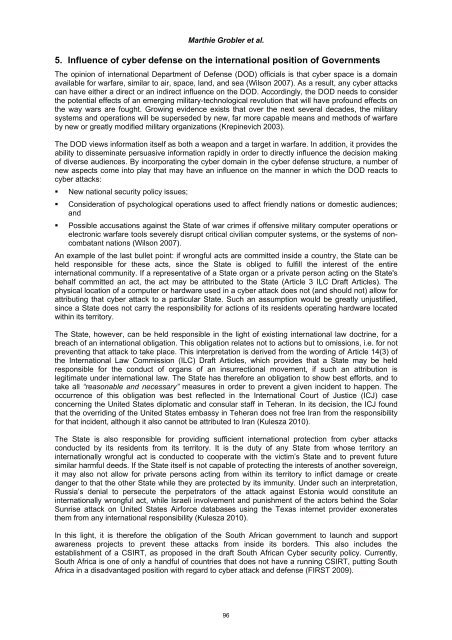6th European Conference - Academic Conferences
6th European Conference - Academic Conferences
6th European Conference - Academic Conferences
You also want an ePaper? Increase the reach of your titles
YUMPU automatically turns print PDFs into web optimized ePapers that Google loves.
Marthie Grobler et al.<br />
5. Influence of cyber defense on the international position of Governments<br />
The opinion of international Department of Defense (DOD) officials is that cyber space is a domain<br />
available for warfare, similar to air, space, land, and sea (Wilson 2007). As a result, any cyber attacks<br />
can have either a direct or an indirect influence on the DOD. Accordingly, the DOD needs to consider<br />
the potential effects of an emerging military-technological revolution that will have profound effects on<br />
the way wars are fought. Growing evidence exists that over the next several decades, the military<br />
systems and operations will be superseded by new, far more capable means and methods of warfare<br />
by new or greatly modified military organizations (Krepinevich 2003).<br />
The DOD views information itself as both a weapon and a target in warfare. In addition, it provides the<br />
ability to disseminate persuasive information rapidly in order to directly influence the decision making<br />
of diverse audiences. By incorporating the cyber domain in the cyber defense structure, a number of<br />
new aspects come into play that may have an influence on the manner in which the DOD reacts to<br />
cyber attacks:<br />
New national security policy issues;<br />
Consideration of psychological operations used to affect friendly nations or domestic audiences;<br />
and<br />
Possible accusations against the State of war crimes if offensive military computer operations or<br />
electronic warfare tools severely disrupt critical civilian computer systems, or the systems of noncombatant<br />
nations (Wilson 2007).<br />
An example of the last bullet point: if wrongful acts are committed inside a country, the State can be<br />
held responsible for these acts, since the State is obliged to fulfill the interest of the entire<br />
international community. If a representative of a State organ or a private person acting on the State's<br />
behalf committed an act, the act may be attributed to the State (Article 3 ILC Draft Articles). The<br />
physical location of a computer or hardware used in a cyber attack does not (and should not) allow for<br />
attributing that cyber attack to a particular State. Such an assumption would be greatly unjustified,<br />
since a State does not carry the responsibility for actions of its residents operating hardware located<br />
within its territory.<br />
The State, however, can be held responsible in the light of existing international law doctrine, for a<br />
breach of an international obligation. This obligation relates not to actions but to omissions, i.e. for not<br />
preventing that attack to take place. This interpretation is derived from the wording of Article 14(3) of<br />
the International Law Commission (ILC) Draft Articles, which provides that a State may be held<br />
responsible for the conduct of organs of an insurrectional movement, if such an attribution is<br />
legitimate under international law. The State has therefore an obligation to show best efforts, and to<br />
take all “reasonable and necessary” measures in order to prevent a given incident to happen. The<br />
occurrence of this obligation was best reflected in the International Court of Justice (ICJ) case<br />
concerning the United States diplomatic and consular staff in Teheran. In its decision, the ICJ found<br />
that the overriding of the United States embassy in Teheran does not free Iran from the responsibility<br />
for that incident, although it also cannot be attributed to Iran (Kulesza 2010).<br />
The State is also responsible for providing sufficient international protection from cyber attacks<br />
conducted by its residents from its territory. It is the duty of any State from whose territory an<br />
internationally wrongful act is conducted to cooperate with the victim’s State and to prevent future<br />
similar harmful deeds. If the State itself is not capable of protecting the interests of another sovereign,<br />
it may also not allow for private persons acting from within its territory to inflict damage or create<br />
danger to that the other State while they are protected by its immunity. Under such an interpretation,<br />
Russia’s denial to persecute the perpetrators of the attack against Estonia would constitute an<br />
internationally wrongful act, while Israeli involvement and punishment of the actors behind the Solar<br />
Sunrise attack on United States Airforce databases using the Texas internet provider exonerates<br />
them from any international responsibility (Kulesza 2010).<br />
In this light, it is therefore the obligation of the South African government to launch and support<br />
awareness projects to prevent these attacks from inside its borders. This also includes the<br />
establishment of a CSIRT, as proposed in the draft South African Cyber security policy. Currently,<br />
South Africa is one of only a handful of countries that does not have a running CSIRT, putting South<br />
Africa in a disadvantaged position with regard to cyber attack and defense (FIRST 2009).<br />
96

















